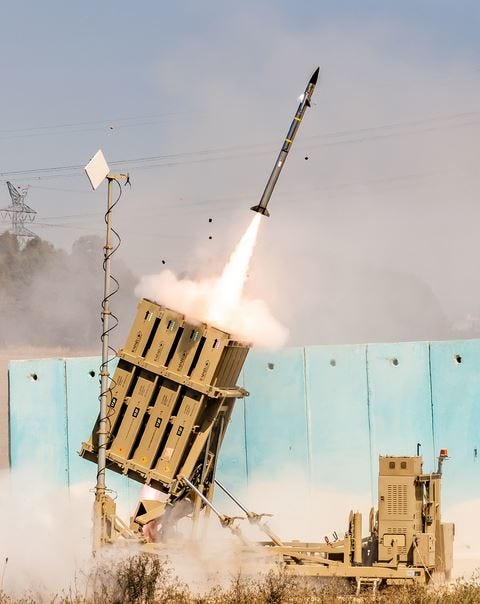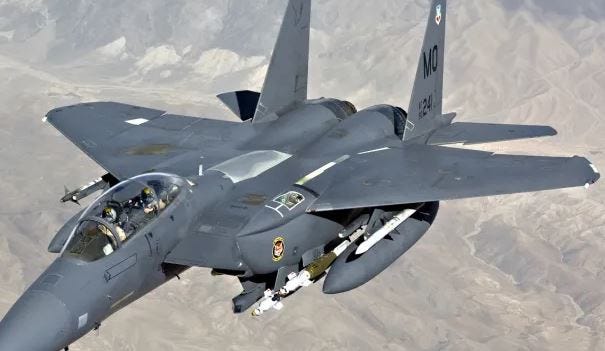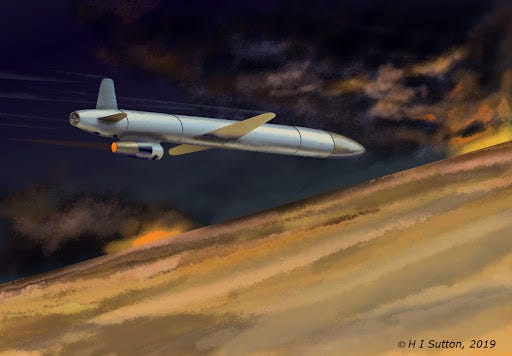Iran strikes back
Last night I posted an article in which I suggested that Iran would postpone retaliation for Israel’s attack on the embassy in Damascus, maybe until next month to avoid giving the “Zionist Entity” an excuse to start a major war.
I also suggested that any payback would be with drones rather than, say, hypersonic missiles, if only because drones are cheap and effective—and also arguably do less ancillary civilian damage and are therefore not so escalatory. Not that Iran necessarily has that many hypersonic missiles at this point. Also, drone attacks are a good way of depleting Israel’s stock of expensive interceptor missiles.
Right after the attack on Damascus, the Axis of Resistance launched 50 drones against Haifa.
To counter them, Israelis would have needed 100 to 150 interceptors. Israelis say their systems are 99% effective. Under test —not real-world conditions, yes. So, damage was done despite the sophistication of their air defense systems.
With swarms of drones, some will always get through. This is the Drone Age (applies to people, too).
And defense itself, an interceptor with the big warhead, can do more damage to innocent civilians than a drone with a small warhead—as we have seen all too often in Ukraine.
Israeli air defense interceptors use proximity fuses that tend to shower the neighborhood with shrapnel.
With drone strikes on Haifa and elsewhere, and the Iranians boarding and taking an Israel bound cargo ship in the Strait of Hormuz a day ago, it was clear that the Israelis bombing of the embassy in Damascus would not go unanswered. As with all such things the only question was “when”.
Since the Western media and Western governments pounding the drums of war, in expectation of a major escalation – perhaps in hopes of a major escalation – I expected Iran to respond—but to take its time.
The only trouble with that idea was that if the Iranians waited until the end of the current news cycle, the US would pretend that it had prevented a war—that Iran was either afraid to fight or just did not have the means. It would be a tacit victory for the US in the Biden administration – and indirectly for Israel, who would get away with thumbing its nose at international law and the international community. Captain America saves the day.
Once the news cycle moved on, US pretensions might be taken as truth.
What the Iranian state did therefore was very smart -- although similar in some respects to their response to the murder of Souliemani-- measured, proportionate, strategic – most important of all giving themselves time – should they really have to fight! With time they get stronger. And their enemies make more and more mistakes and get weaker and weaker. As I pointed out last time, the Israelis are clearly losing – as American proxies tend to do. As the US itself is.
Maybe the Iranians learned something from the Russians in Ukraine. Time is a weapon.
So the Iranians launched an attack last night– which the media characterized as "massive"– even though it wasn’t that big-- although much larger than the Axis of Resistance attack on Haifa.
The Iranians launched drones in waves. And later cruise missiles. The Americans say 170 drones and 30 cruise missiles—about 200. The Israelis – ever prone to exaggerate— say more than 300 "projectiles"– including ballistic missiles!
The Iranians declared main target was the air base from which the Israelis mounted their attack on the embassy in Damascus, which under article 51 of the UN charter would be a legitimate target. There were other targets as well, including another airbase.
As was the case with the airstrike after Souliemani's death, Iranians gave warning. In any case. At 115 mph, it takes drones hours to cover the distance between Iran and Israel— which meant the Americans and the British had lots of time for detection, tracking, target acquisition and interception by aircraft.
Nor were the Iranians using their latest drones or missiles-- just the cheap stuff—to make it all easier.
The intention was obviously not to inflict militarily significant damage but just to demonstrate capability.
It was therefore a demonstration. A response – but not escalatory.
There was only one reported casualty -- a 7-year-old Bedouin girl in the Negev who was hit either by a drone off course or shrapnel from Israeli air defense interceptors.
A Shahed 136 drone—now being replaced by the Shaded 236—costs the Iranians about $10,000 to make— $170,000 for 170 drones. Fighter jet operating costs are about $20,000 per hour. And an AIM 9 costs $472,000, about half the cost of an AMRAAM.
The Americans and the Brits scrambled a lot of aircraft. Imagine how much it cost to shoot down those drones! This was a very cost-effective operation for Iran – and very expensive one for the US and UK. Although Raytheon was probably really happy.
The 30 cruise missiles launched after the deluge of drones –were also older, less expensive models—but harder to shoot down than drones.
Ultimately, Israel still had to use its advanced air defense system-- which of course is very very expensive.
The strike cost the US, the UK, and Israel millions. The cost to the Iranians was much much less. And their Raytheon shares went up.
The upshot is that the Iranians have proven they are not afraid of the US or Israel – and that they have the means to retaliate. They have also demonstrated restraint and proportionality -- qualities valued by their new allies. Russia and China.
Their statement to the UN was classic: "the matter can be deemed concluded".
The Americans have said they will not support an Israeli offensive operation in response the attack – although they cooperated in Israel's defense against the Iranian attack. Will Israelis listen? Or are they looking for a new Masada?
This Iranian cleric tends to animals in need….Islam prohibits animal cruelty and promotes feeding those in need.
He has 80,000 followers.
Coffee Time
If you liked today’s article or just want to show support and get the next Special Article for Coffee Buyers which discusses Biden’s policies through the lens of his State of the Union address, you can click here to buy me a coffee! Or on the photo above.







Thanks for pointing out what a strategic move Iran just made, Julian.
"Last night I posted an article in which I suggested that Iran would postpone retaliation..."
Well... predictions are hard to make, especially about the future!
said Yogi Berra.